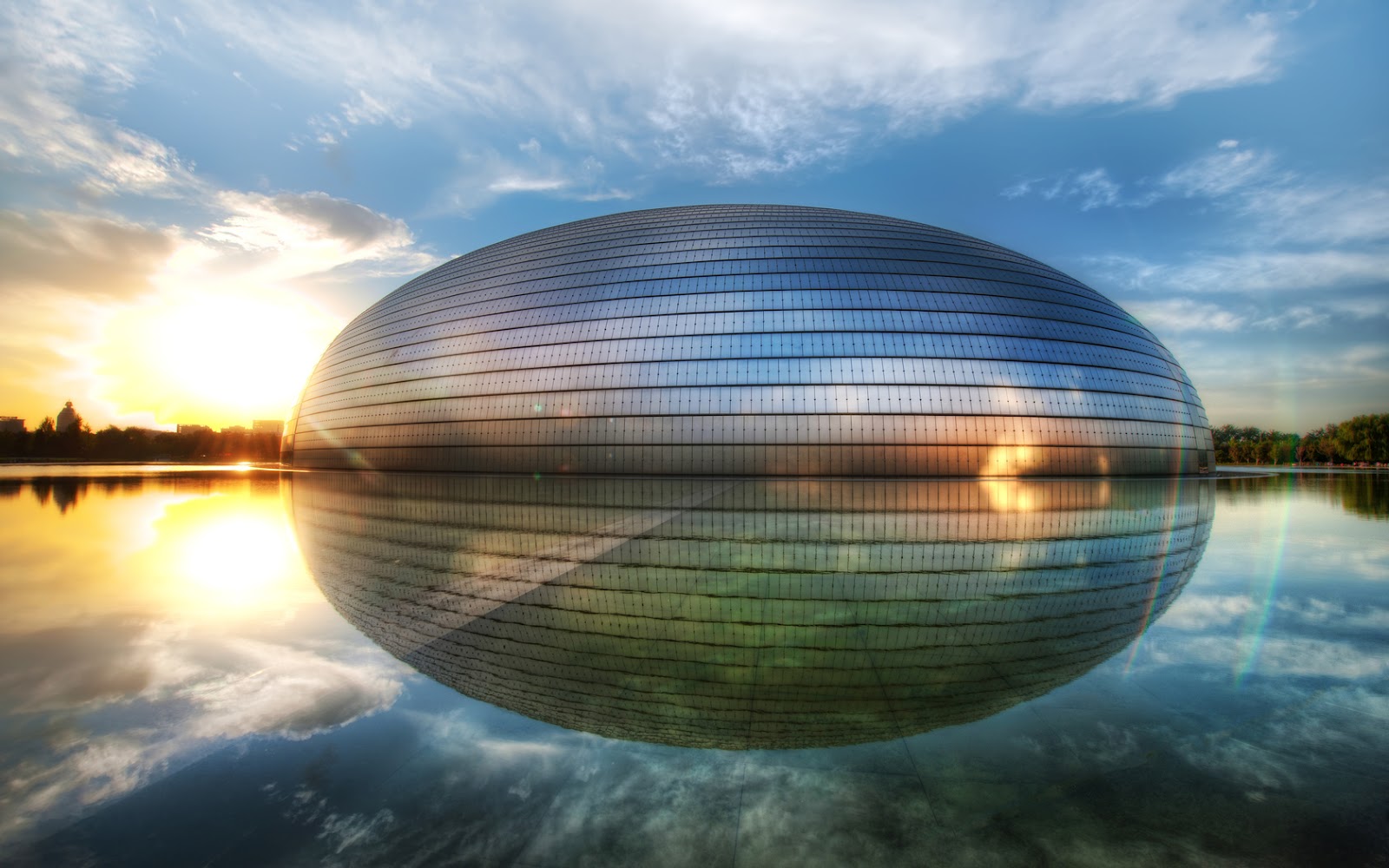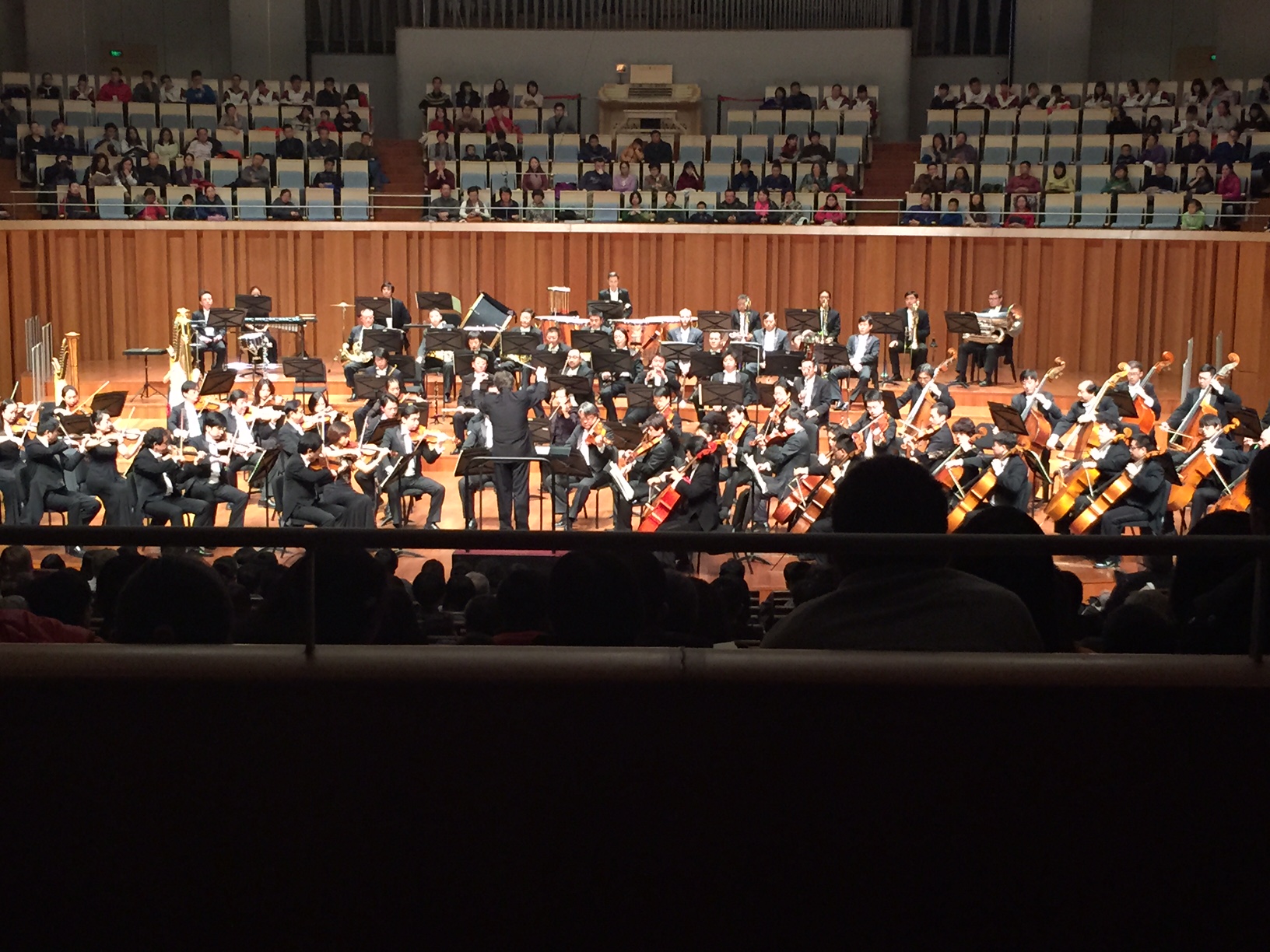Beijing Symphony Orchestra Plays Strauss and Brahms
December 22 2014Last night, as part of Richard Strauss’ 150th anniversary year, the Beijing Symphony Orchestra played his Don Juan Overture and Der Rosenkavalier Suite. We were also treated to Brahms’ pastoral Symphony No. 2. Marc Moncusí conducted. This was the first time I’ve seen a live performance by a Chinese orchestra. The Beijing Symphony Orchestra is not the best China has to offer (I think that would be either the China Philharmonic Orchestra or the China National Symphony Orchestra). My personal experience is that there is plenty of room for improvement.
First I’ll comment on the hall within the National Centre for the Performing Arts (NCPA). The NCPA was built as part of the 2008 Olympics and it’s truly beautiful from the outside. It looks like a perfect half-egg and there is a moat of water surrounding it. It’s very simple, and it fits well within its surroundings.

This was my second time in the NCPA. We had tickets back in 2012 for a dance performance to the music of Mahler’s Symphony No. 3. That one was in the dance theater, while the one last night was in the concert hall. The Mahler dance performance performance was pretty cool. It was interpretive dance with Mahler as the backdrop. Unfortunately, the music was a recording and not live.
This time in the concert hall, we had great tickets thanks to Celia’s uncle’s friend. We sat in the middle of the ground floor, with a great view of the entire orchestra. Unfortunately, the acoustics were not great. It’s hard to tell if it was the orchestra or the hall, but the orchestra just didn’t have “presence”. Even during the loudest climaxes, I didn’t feel any volume of sound. As a result, it always seemed like the orchestra lacked energy.
The playing was actually pretty well-coordinated from a visual standpoint. The violins were completely in sync, and they all seemed to play with the right amount of energy (unlike the Seattle Symphony, where many of the members sitting in the back have very low energy). However, the aural result was lacking. Notes were often played out of tune. Difficult passages sounded like they were faked (it’s easy to tell because suddenly you can only make out a few individual players). And while the orchestra generally did well with tempo changes, they were often of the on/off binary tempo changes, as opposed to tempo changes happening organically.
I think maybe the best way to think about this orchestra is that it is a second or third-tier regional orchestra. Something akin to a professional soccer club in Brazil. Sure, some really talented performers play in that orchestra. But nearly all the most talented musicians that China and Beijing produce end up in the world’s top tier orchestras (e.g., Chicago Symphony Orchestra and Real Madrid) rather than staying home.

One of the interesting things about going to this concert in China is how the audience behaves differently from western audiences. The audience is much younger, with many young children (even 4 or 5 years old). The hall is kept brighter than western performances, where the audience is entirely in the dark. People often take pictures with their phones during the performances. In fact, the ushers have laser pointers that they shine at people’s phones to make them stop. If we end up moving back to China, a nice fringe benefit is we’ll be able to take Melody to her first concert much earlier.
Another thing that’s different is the audience doesn’t really know how to applaud. They applauded for every single break between movements in the Brahms. Crucially, they applauded at the final climax of Don Juan, before the piece concludes (this one might be on the conductor - he didn’t have to wait so long during the grand pause). Finally, and most strikingly, they really did not applaud the orchestra at the conclusion of the performance. Moncusí did come back for a bow, but the audience nearly stopped clapping when he first walked offstage. In general, the audience was not very full (I’d estimate around 50% attendance), and many people with children left early.
I’m willing to be patient and open minded. This is my first time hearing them, so it’s possible this was an off-night. But, next time I’m in China, I think I’ll try to take in either the China Philharmonic or the China National Symphony Orchestra.
comments powered by Disqus